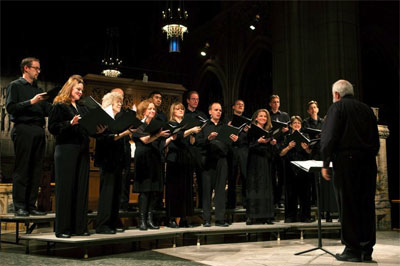by Mike Telin

“This is the fifth year in a row that we’ve done this, said Quire’s founding Artistic Director Ross W. Duffin. “It’s become a tradition. I think audiences have come to expect it and I know we certainly look forward to it.” Although Quire’s programs generally focus on early choral repertoire, this year’s Carols for Quire will be a bit of a departure for the ensemble. “The idea for the program came from Quire co-founder, secretary, and countertenor, John McElliott. He wanted Quire to do some of the great iconic twentieth century English carols,” said Duffin. “He sent me a list of pieces. They’re fabulous, but I thought that because Quire was really formed to perform historical music, maybe what we should do is to take each carol and pair it with an earlier work on the same or similar text.”
Duffin believes this way audiences can hear how composers from different periods of time were inspired by the same text or subject matter. He also points out that a lot of twentieth century-composers were and continue to be interested in medieval music.“It’s a different idea for organizing a program, although in a way it relates to the program we did with Tim Brown in October 2011 where he paired early English works with the more modern.”
Two examples of medieval texts that later inspired twentieth-century English composers are the English 15th century Alleluia: a newe work — to be followed by Peter Wishart’s 1952 setting of the same text — as well as Duffin’s own arrangement of the13th century text Procedenti puero, which inspired Peter Warlock’s 1918 Benedicamus Domino.
Duffin said that pairing the old with the new gave him a tremendous variety of iconic carols to choose from. “For example, Jesus Christ the Apple Tree (1805) of Jeremiah Ingalls followed by the 1967 setting of the text by Elizabeth Poston. Musically they’re poles apart but they’re wonderfully different inspirations from the same text.”
One pairing that Quire Cleveland’s Executive Director Beverly Simmons finds particularly is interesting is Thomas Tallis’s setting of the hymn O nata lux (1575) followed by Eric Whitacre’s Lux aurumque (2009) “Eric has made a name for himself for his virtual choirs on YouTube and Lux aurumque is the piece that caused him to rise to prominence. It’s very modern and yet the music is reminiscent of medieval tones.” “Whitacre actually started with an English text,” Duffin explains, “which he had translated into Latin to give the work a sense of authority.”
Another set with a nod to the twenty-first century will begin with Es ist ein Ros (1607) of Michael Praetorius followed by A spotless rose (1919) of Herbert Howells (1892–1983) and concluding with Paul Mealor’s A spotless rose (2010). “Paul shot to fame last year because he composed a piece for the royal wedding of William and Kate. It is such a gorgeous piece, very virtuosic and so beautiful,” said Duffin.
Beverly Simmons sees this weekend’s program as an opportunity to stretch Quire’s musical boundaries: “our repertoire and musicianship and to tie together all the things that we love about choral music.”
The concerts also include a pairing of Wassail songs: the Kentucky [Ohio] Wassail Song collected by John Jacob Niles and Vaughan Williams’s Wassail Song. Wassail is an ancient toast and also a mulled cider that was drunk as part of “wassailing” festivities. Some wassail songs found their way to North America, and Duffin said the first one they are singing was collected by the Kentuckian composer and balladeer, John Jacob Niles. “I have created a harmonized version and changed the words slightly to make it more appropriate for Ohio, since Kentucky did not have much claim on the lyrics in the first place!”
Other carols Quire will sing both in old and newer versions include The Coventry Carol, The holly and the ivy, Stille Nacht (Silent Night) and In the Bleak Midwinter.
Published on ClevelandClassical.com December 17, 2013
Click here for a printable version of this article.


